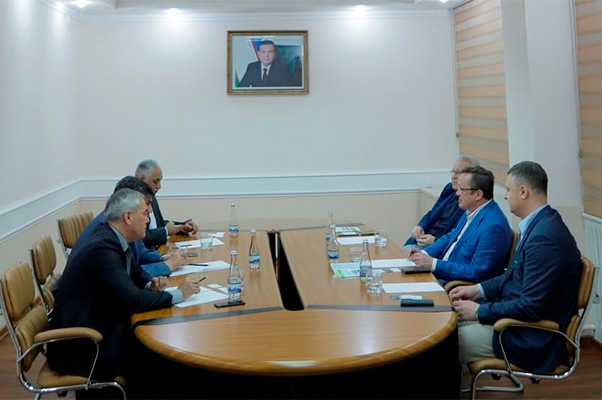
Expert: New economic course of Uzbekistan serves establishment of Polish-Uzbek Chamber of Commerce and Industry
During the meeting, the sides exchanged views on the current state and prospects of cooperation between entrepreneurs of Uzbekistan and Poland within the framework of dynamically developing trade and economic relations between the two countries.
The Uzbek side provided information on opportunities created in the country for foreign investors and reforms, conducted in this area. It was noted that Uzbekistan is open for cooperation with other countries on an equal and mutually beneficial basis.
Kozlowski highly appreciated the progress of large-scale reforms in Uzbekistan, dynamic development of economic policy, aimed at ensuring the country’s competitiveness in the international arena, formation of favorable business and investment climate, and the country’s greater opening to the outside world, especially in the light of the development of tourism and foreign trade.
According to him, he has been working in the Uzbek market for more than 10 years, has relevant experience in the textile industry, creating intensive gardens, introducing modern agricultural technologies into agriculture, etc.
"But over the past 1.5 years, there have been such changes, which we thought would take decades, for example, to resolve the issue of liberalization of monetary policy, which greatly increased the rating of Uzbekistan in the eyes of foreign investors, particularly Polish ones.
Michalski added that "having worked as a trade representative of Poland in Uzbekistan for the last 8 years, I can tell by my own experience how the country has changed over the past year and a half or two. It is a new, dynamically developing and attractive for tourists and for business Uzbekistan. Polish entrepreneurs are interested in opening their own business in your country, creating new joint ventures here to bring new technologies, especially in the field of agricultural development, cultivation, processing and export of fruit and vegetable and other agricultural products. "
Speaking about the prerequisites the creation of the Chamber, the Polish side particularly stressed that its establishment is connected with new economic course of Uzbekistan, removal of various barriers and creation of opportunities for full-fledged foreign trade, and a sharp increase in the volume of Uzbek fruit and vegetable exports to foreign countries.
It is underlined that one of the main tasks of the Chamber is formation of a platform for discussing topical economic issues, promoting development of joint Polish-Uzbek business, establishing direct contacts between representatives of small, medium and large enterprises of the two countries, implementing their joint projects, particularly in industry , trade, agriculture, services and other areas. The Chamber strives to become an organizer of various business forums, an active participant in the development of joint major economic and investment projects.
The sides also discussed issues related to expansion of trade representations of Uzbekistan in Poland and Poland in Uzbekistan, promotion of goods under the brand "Made in Uzbekistan" to external markets, primarily European. There was expressed interest in deepening cooperation and developing joint projects in textile industry, developing intensive gardens, building greenhouses, creating joint laboratories for growing seedlings, potato seeds, processing and exporting agricultural products, etc.
In this regard, UzLiDeP, as a party reflecting the interests of entrepreneurs and business people, and the Center for Support of Entrepreneurship and Farming are able to contribute to expansion of contacts between Uzbekistan and Poland.
The sides expressed confidence that the Polish-Uzbek Chamber of Commerce and Industry, which began its activity, will play a significant role in developing relations between the entrepreneurs of the two countries.
At the same time, introduction of a new strategy of foreign exchange interventions, coupled with a balanced budget, helped to offset the impact of growth in the loan portfolio on the growth of the money supply.
Nevertheless, the above-mentioned rates of increase in lending require an increased attention in terms of inflationary risks in the economy, the regulator stated.
The positive level of the real interest rate and the relatively high level of profitability of deposits in national currency supported the population’s propensity to save. Term deposits in national currency for January-March increased by 9.5 percent.
Real growth rates of investment in fixed assets in the first quarter reached to 29 percent, which is mainly due to the expansion of housing construction programs, development of social infrastructure and the implementation of investment projects in other sectors of the economy.
According to the Central Bank studies, the qualitative implementation of targeted development programs and achievement of tasks to increase the efficiency and competitiveness of the productive sectors of the economy can lay the necessary foundation for ensuring price stability in the medium and long term.
The key here is transformation of directed investments and structural transformations into productivity growth and cost reduction in these sectors.
The Central Bank will adhere to a cautious approach in the conduct of monetary policy and will maintain the refinancing rate at level 14 percent per annum, the statement reads.
At the same time, the Central Bank said that, despite the high levels of nominal interest rates in the economy, real interest rates remain at a minimum level (close to zero). At the same time, the task of preserving macroeconomic stability risks at a low level, along with maintaining the necessary conditions for a qualitative economic reform, determines the continuation of the current monetary policy.
The Central bank said that the regulator will continue to monitor the dynamics of internal and external factors of inflation and, accordingly, adjust monetary conditions taking into account the nature and degree of inflation risks in the economy.
The next meeting of the Board of the Central Bank to review the refinancing rate is scheduled for the second half of July 2018.